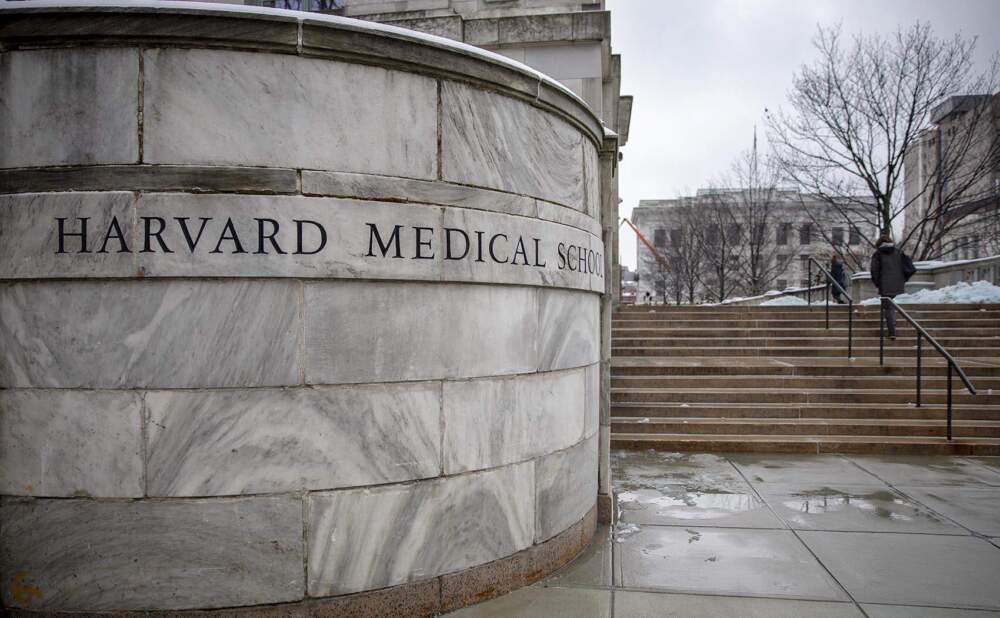Advertisement
Harvard report on morgue thefts is delayed, frustrating affected families

Five months after the shocking allegations that a Harvard Medical School morgue manager stole and sold body parts, the school has yet to release a promised review of its program by outside experts.
In June, Harvard named a panel of specialists to evaluate the elite medical school’s anatomical gift program and detail how to improve the security of bodies donated for medical and dental students' studies. An estimated 400 donors may have been affected by the alleged thefts.
Harvard has now twice delayed the report, which was originally slated for release at the end of summer, then pushed to the end of October. The school has offered no updates on its progress — even to affected families.
“There's been absolutely nothing from them, and I feel like they just don't care,” said Amber Haggstrom, whose mother, Donna Pratt, donated her body to Harvard in February 2020. After a career as a hairstylist, Pratt spent her final years living with her daughter, son-in-law and grandsons.
“It’s not fair to myself or any of the other families, because we do need some closure,” Haggstrom said. “We need answers.”
Harvard has declined to say precisely when the report will be completed.
Families said they've heard little from Harvard beyond a letter informing them of the alleged crimes, after morgue manager Cedric Lodge was arrested in June. Some letters informed families a loved one's remains were not impacted, while other letters indicated Harvard could not rule out that a particular body was affected.
Prosecutors at the time of the arrest said they had uncovered a “nationwide network” of people buying and selling human remains. Many were sourced from Harvard’s morgue, they alleged.
The Harvard review panel, which includes a former medical examiner and two leaders of other body donation programs, is supposed to evaluate the morgue’s policies and practices and provide “constructive feedback and recommendations to improve the security and integrity of the program.”
“It’s a joke. It’s a disgrace,” said Paula Peltonovich.
Advertisement
Both of her parents worked in law enforcement in New Hampshire and decided to donate their bodies after death to Harvard. Her father, Nicholas Pichowicz, died in 2019, and her mother, Joan, died last March.
Peltonovich was so horrified by the thefts at Harvard, she had her mother’s body returned to the family and buried her. She insisted on seeing her mother’s body at the funeral home because she didn’t trust that Harvard would return the correct remains.
Peltonovich said she feels Harvard has shown little care for the families, and she doesn’t have high hopes for the report.
While the criminal case unfolds and the review is pending, Harvard has apparently put the program on hold. A recorded message on the voicemail of the anatomical gift program tells callers that Harvard is not currently accepting body donations, including from registered donors who've recently died. The message says the school is still signing up future donors.
Lara Szent-Gyorgyi wonders how Harvard will change its practices to ensure something like this doesn’t happen in the future. Her mother, Gwen Szent-Gyorgyi, donated her body to Harvard in 2017, after a career working in labs and a retirement spent in her beloved Woods Hole.
“What I would hope to see is something that's relatively transparent about what they can do better,” Szent-Gyorgyi said. “I suspect they're not going to want to do that, given that there is a lawsuit.”
In fact, Harvard faces eight separate lawsuits filed by families of donors. Lodge and two of his supervisors in the anatomical gift program are also named in some of the suits.
Harvard indicated in court documents that it will seek dismissal of the suits by claiming immunity under the state’s uniform anatomical gift act.
The immunity clause in the law was designed to protect medical institutions and doctors in lawsuits involving organ donation, according to George Annas, director of the Center for Health Law, Ethics & Human Rights at Boston University. Because of the broad nature of the clause, which states that anyone acting “in good faith” shall not be liable, Harvard has a “good shot” at avoiding liability, he said.
“Certainly it doesn’t directly protect some guy in there stealing stuff,” Annas said. “But that’s more of a crime against the university — unless they negligently let him do that. That’s going to be the argument.”
Haggstrom called Harvard’s efforts to claim immunity and evade responsibility a disgrace.
“I signed papers to donate my mother's body to science,” Haggstrom said. “I did not sign a paper that said, hack my mother up and sell her for profit.”
Lodge, along with his wife, Denise, pleaded not guilty last June in federal court in Pennsylvania to charges of conspiracy and interstate transport of stolen goods. Prosecutors allege Lodge allowed buyers to enter the morgue and essentially shop for parts: dissected faces, human skin, brains. He allegedly brought home other body parts to New Hampshire, where they were shipped through the mail to buyers across the country. Tens of thousands of dollars were exchanged.
Other alleged buyers, Katrina Mclean of Salem, Joshua Taylor of Pennsylvania and Matthew Lampi of Minnesota also have pleaded not guilty.
One dealer, Jeremy Pauley of Pennsylvania, pleaded guilty in federal court in September to conspiracy and transporting stolen property, admitting he knowingly bought and sold stolen remains from Harvard and a mortuary in Arkansas.
